Desire something something
An illustrated letter addressed to the Reader recounting Substack's Stacked Debates: The Digital Sexual Revolution, held on September 16th in Chicago.
Dear Reader,
Perhaps nothing is more loosely put than the word ‘desire’. It’s a word I know as polymorphic, claimed by anarchists, astrologers, psychics, musicians, philosophers, psychoanalysts, romantics, theologians, and urban planners, among other disciplines. If love is possession, implying the legal and the economic, what a person has or had, desire denotes the exact opposite: a rental history of what an individual did not have.
The word of the night at the Chicago iteration of
’s Stacked Debates is arguably ‘desire,’ fitting for the event’s subtitle: The Digital Sexual Revolution. Substack’s teams for this night of ‘Stacked Debates’ are multifarious and impressive in scope: anthropologists with comedians and psychologists with sociologists ( and vs. and ), academics and writers ( vs. ), as well as journalists and novelists ( vs. ). I’ve pluralized and simplified the listed occupations per team because these debate participants’ output is cross-disciplinary; Monahan belongs to the artist collective K-Hole, Bloom has written a slew of books on psychology, Perdue is a novelist and woman of letters, and Aella, Lindsay, Rosenfeld, and Dee are all podcasters, Internet culture writers, and historians. I’ve still yet to scratch the surface of what all tonight’s interlocutors do, but hopefully I’ve provided a generous introduction.Dee, Blassie, Aella, Bloom, Perdue, Monahan, Lindsay, and Rosenfeld all have some stake in the subject of desire. With topics ranging from AI, the Internet, pornography, and the confluence and intersection of all that’s listed, this series of debates is anything but sappy. Desire is best served with sex, a domain it shares with the more sentimental topic of ‘love.’ Tonight’s animated discussions flit from the academic to the anecdotal, interpersonal, and pop cultural. Always peppered with audience laughter, our master debaters are affable and relatable as they take us through Alanis Morrisette lyrics, case studies, memes, popular porn search terms, and their personal lives. Again, my keyboard is about to run out of breath as I try to summarize the scope of The Digital Sexual Revolution’s discourse and participants.
I’m going to briefly outline the formalism of The Digital Sexual Revolution before I tell you about love as medium and form. Tonight’s Stacked Debates were in this format: the first two debates consisted of two opponents, one arguing in the affirmative and the other the negative of a given question (Sean vs. Noelle, Kat vs Kate); the third debate consists of teams, (the teams being Katherine Dee and Blassie, along with Paul Bloom and Aella), resulting in Katherine vs. Paul and Blassie vs. Aella. The questions are paraphrased as follows: Will AI take over porn? Is it cheating if it’s with AI? And is the Internet reprogramming our desires? The winner, or in the case of the third debate, winners, is determined by which interlocutor(s) received the most (loudest) applause.
You’ll recall I mentioned anarchists, astrologers, musicians, philosophers, psychoanalysts, romantics, theologians, and urban planners as all having a stake in the topic of desire. Language mediates these vocations. You also note that this account is addressed to ‘you’. Tasked with trying to put some sort of container on The Digital Sexual Revolution, I could think of nothing more appropriate and desirous a form than the letter. This is apt, as all participants engage in some form of writing, whether hosted by media outlets like GQ or Slate, publishing houses such as Penguin Random House and HarperCollins, or social media platforms including Substack and Twitter. Debate may seem to be all talk, but this is undergirded by each participant’s writerly output. These people want to communicate with the audience, with you, and language is their common medium. I also want to communicate, so I’ve chosen writing as my medium.
Nothing is more desirous than language. We address others (or, as famed psychoanalyst Lacan repeatedly put it, The Other), through a kind of lack. We don’t have their input, their perspective, and ultimately, through relationships with others, we pursue what is missing. This trope connecting desire and language, the marriage proposal: You complete me. A declaration that can be platonic or romantic, but always erotic: I miss you. And without much ado: I love you. Note that each pronoun is accompanied by a verb. Love is action.
Love is best sutured to action when considering the formal convention of letter writing. Yes, everything from Ovid to the Song of Solomon to Shakespeare’s sonnets is a love letter, and this writerly medium is practiced by the anonymous and the famous alike. It’s simply popular. Epistolary correspondence has yet to fade in relevance; contemporary love letters are often shorter, now expressed through emails, text messages, and emojis. Love and its more base relative, desire, are declared, subject to the present moment. Love is something you do.
Then what is desire? I’ve said that love is action, always happening externally. If love is what you do, always exteriorized, an object being acted upon, then desire is defined by its interiority and stasis. Desire is paralysis, the suspension of a relationship between the subject and object, I and the Other.
Let’s return directly to the topic at hand. The first debate between Sean Monahan and Noelle Perdue concerns AI’s leaching into pornography. Perdue believes AI will be unable to take over pornography, while Monahan declares its ascent and eventual predominance in Internet porn. I’ll spoil the applause-determined outcome: Noelle wins. Sean is a noble competitor against Noelle, but perhaps the latter’s argument is more appealing because it is earthy in nature: desire is material. Noelle deftly uses examples that ground desire in reality; for instance, the popularity of the girl next door trope in Internet porn is based on its sheer mundanity. Further, the materiality of sex, and its popular optics, pornography, is always relational. Like language, the medium suspended in the fluid membrane occurring between I and the Other, sex happens between people. This excludes masturbation, tonight’s sort-of taboo lurking under all discussions of AI, Internet pornography, and romance. Note that in the early history of psychology charted by Freud, masturbation was linked to neurosis and best seen as a waste of sexual energy. If sex’s counterpart and condition is the couple, then masturbation’s complement and circumstance is the individual. You get off (singular gerund form) by yourself, you have sex with (prepositional) someone. Gerund and preposition seem to be the source of contention between Sean and Noelle. They disagree over the psychological roots of sex work phenomena like findom. Sean charges that findom is the result of loneliness: men want to waste money. Noelle comes in with a relational addendum: men want to waste money with women, not just by themselves; otherwise, cryptocurrency, gambling, and online shopping easily suffice. Perhaps Sean’s loss may be the result of optimism for the future because most people are aware of the cosmic ramifications of Artificial Intelligence, what it means for everything from cultural production like art and music to the economy. He warns that the discourse on AI highly parallels the fatalism surrounding the emergence of the Internet; even back then, people thought that the World Wide Web was a mere fad.
I’ll admit, I was torn over who to clap for. Noelle shutting down Sean’s premonitions didn’t leave me any less wary of AI’s takeover of pornography. Everyone else in the audience felt similarly, with the volume of the applause being nearly equal for the two debaters, and the estimation for Noelle barely edging out that of Sean’s. Ultimately, Sean and Noelle’s argumentation left me with this: what about desire is sublimated? After Lacan, how do we transmute libidinal energy into the non-sexual? You saccade to the following paragraph, indicating that I’ve left you hanging. Don’t worry, I’ll return to sublimation shortly.
The second topic argued by Kate Lindsay and Kat Rosenfeld concerns the contentious and often moralized subject of cheating. Is it cheating if your illicit affair is with AI? First, in the negative, Kate: it is not cheating because A.I. is not a person. On the positive side, Kat, it is cheating because AI is like a person. I’ll admit that Kate and Kat both held their ground, as this question was the most vulnerable to semantics, such as what constitutes cheating. Cheating is something everyone disagrees about, evidenced by the emergence of cheating subforms: cyber affairs, emotional cheating, financial infidelity, and micro-cheating. But the introduction of the topic of AI introduces new terrain. Is A.I (one thinks of Scarlett Johansson in the movie HER), a person? I am reminded that what determines a person can become particularly tricky, considering the concept of corporate personhood. Is it cheating if it’s with Siri? That being said, the audience was more partisan when it came to this second question, and Kat clears Kate. I think again that the outcome of the debate probably went this way because the audience rationalized based on both the material and the personal: if my partner were sleeping with an AI chatbot, I would consider it cheating. What I’m trying to say is, while all the questions were well-argued, the queries were mostly framed as a kind of precognition. The participants are (well-reasoned) psychics, trying to plod the landscape of future desires, and we are their clients. These debates play into the superstitious. Another note on the form of the Stacked Debates is that the applause is determined by whether the interlocutor effectively changed the mind of the audience. What I’m saying is that we can’t know who will be right, only what was argued most effectively. I think Kat wins because rhetorically she plays into the pathos of the argument and the psychological effects of cheating. This leaves me wondering: is the power of AI due to the capital behind it or the susceptibility of human psychology to its charms? Let’s briefly return to sublimation and Lacan by establishing that whatever appeal Artificial Intelligence has to hopeless romantics and onanists is because of this excess sexual energy of the libido. Some may turn to painting or music to burn off sexual excess, while others will go to robots.
The final question of the night, on whether or not the Internet is reprogramming our desires, is the least superstitious and the most philosophical. This third debate results in a member of each team facing their opponent, and is by far the best elaborated topic of the night. With Paul and Aella arguing that the Internet has less effect on an individual’s desire than its accredited, Katherine and Blassie are left with a difficult task to prove in the positive that, yes, we are shaped by the times we live in. This argumentation is based on the classic trope of nature vs nurture: what is innate, and what is conditioned. Paul, ever the psychologist, begins by buttressing his argument with the emergence of homosexuality as a sexual identity in the 20th century and the growing popularity of conversion therapy in reaction to it. It’s classic chicken or the egg; do more people identify as LGBTQ because queerness is more visible, or was it always this way, no matter if it’s 1200 B.C. or 2025 A.D.? Aella swiftly supports Paul’s rhetoric, disproving the opposing team’s evidence of case studies on sexual fetishes with her own research. Katherine and Blassie have it hard because it’s impossible to say whether desire is evolving in relation to emerging technologies. While Katherine and Blassie argue that the Internet affects sexual desire because the Internet is a given cultural condition of the contemporary moment, Paul and Aella disprove the importance of conditionality by arguing that conditioning is negligible when faced with nature. Notably, this third question beautifully wraps up what’s at stake throughout all three topics: the role of an individual’s milieu (sometimes affected by something as particular as artificial intelligence and in other instances, as broad as the Internet) in the shaping of their lust.
Reader, I’ve probably hit you over the head with tmi. I’d like to conclude my account with a recap of Paul’s final subpoint in his and Aella’s argument, as well as the outcome of the third question. Paul and Aella win not only because of their extensive background in psychology and sociology, but also because their arguments are more scholarly, in contrast to Katherine and Blassie’s more vernacular style. Paul’s final point—that young people consider the influence of technology on romantic and sexual desire to be novel because they lack the perspective of age—succeeds not because of who has seen more throughout their life. It’s because what is changeless and timeless about humanity is what we and the audience can depend on. We might not use fax machines anymore, or we’re scared about self-driving cars, but we can always count on this: people are going to continue to have sex, because they always have. The degree to which something is about desire or sex, love or romance, lack or possession, is irrelevant. The Digital Sexual Revolution leaves us with this: we are creatures of habit.
Sincerely,
Brianna
Illustrations by Blaise Larmee




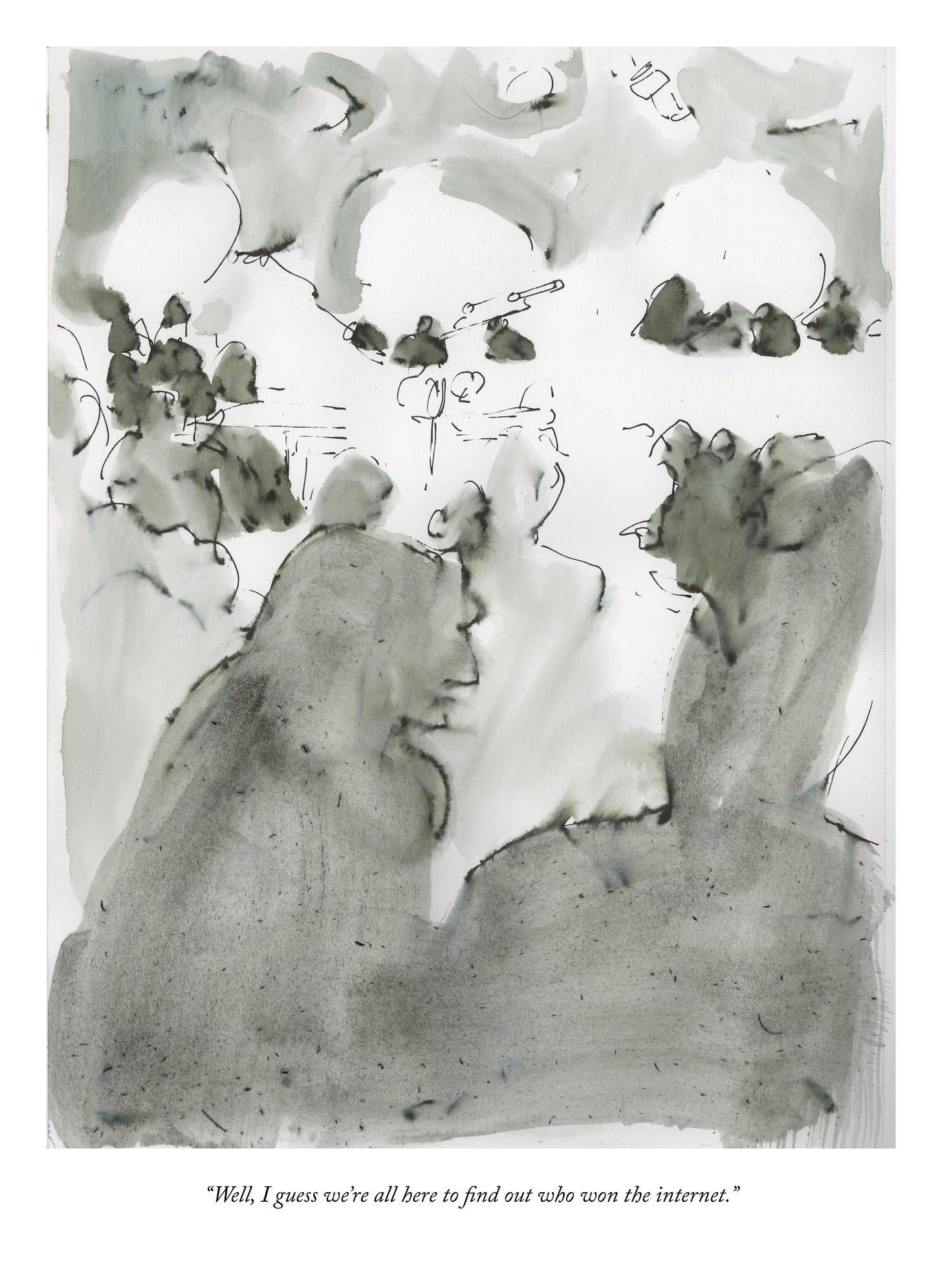
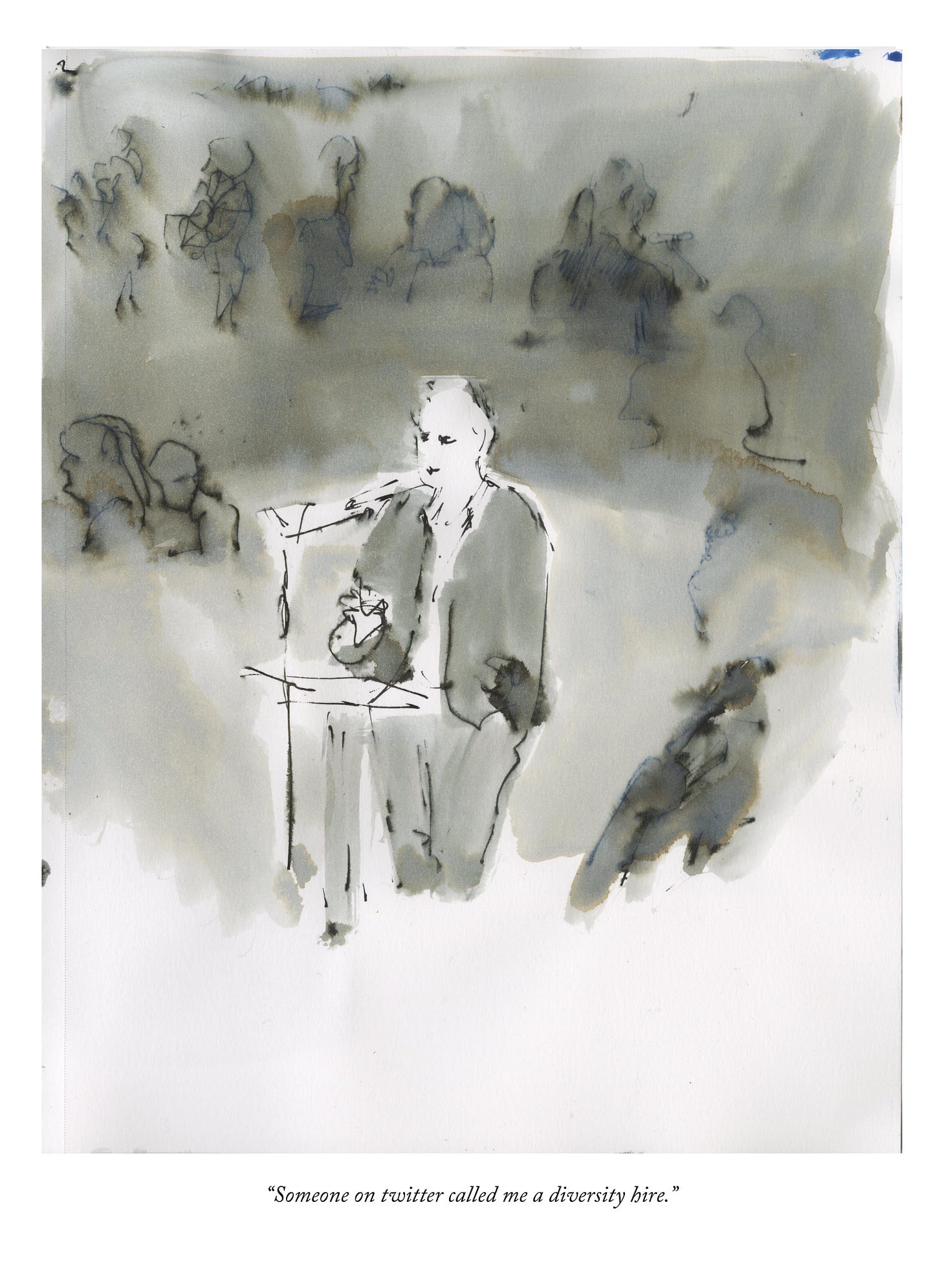
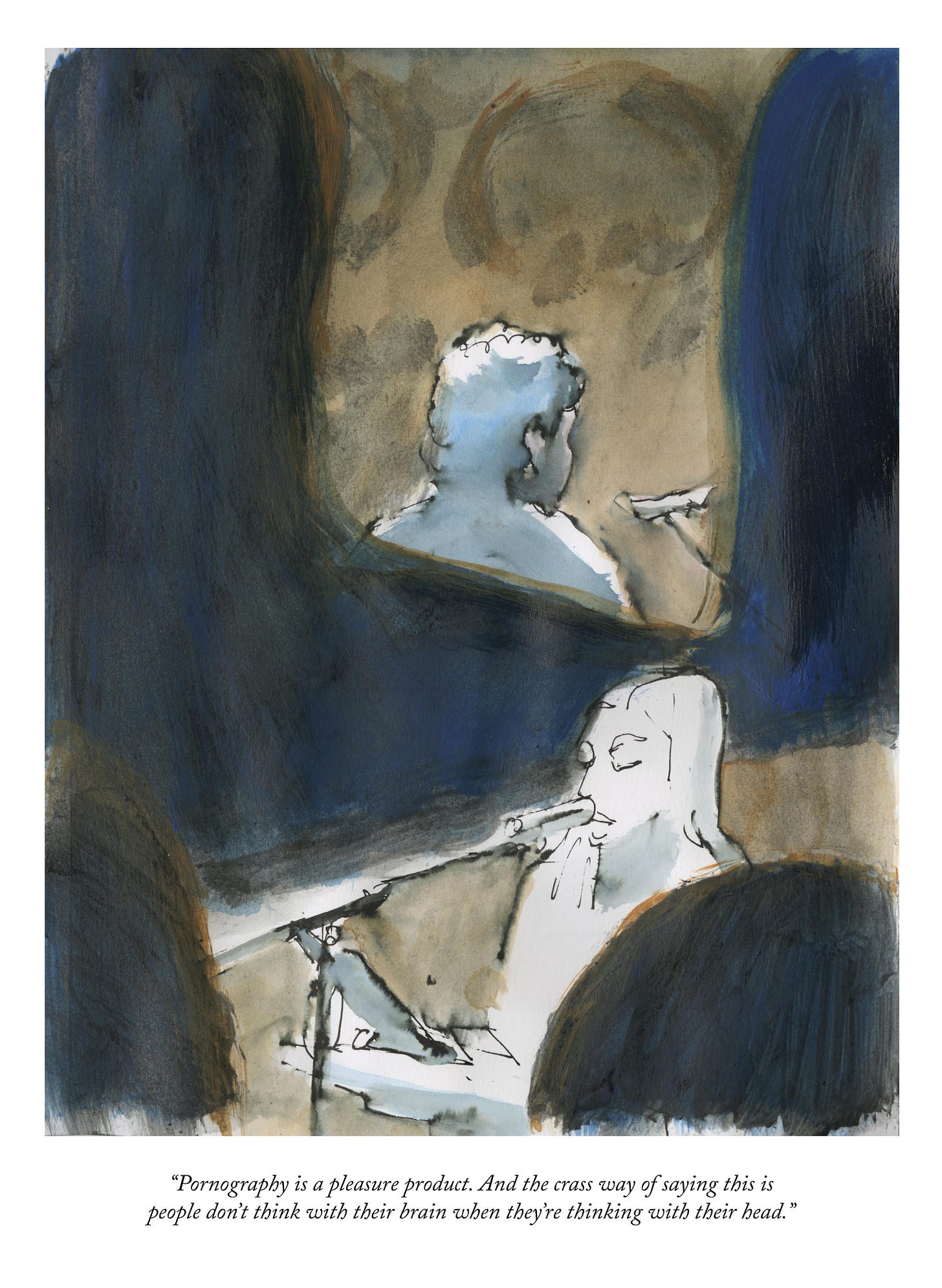
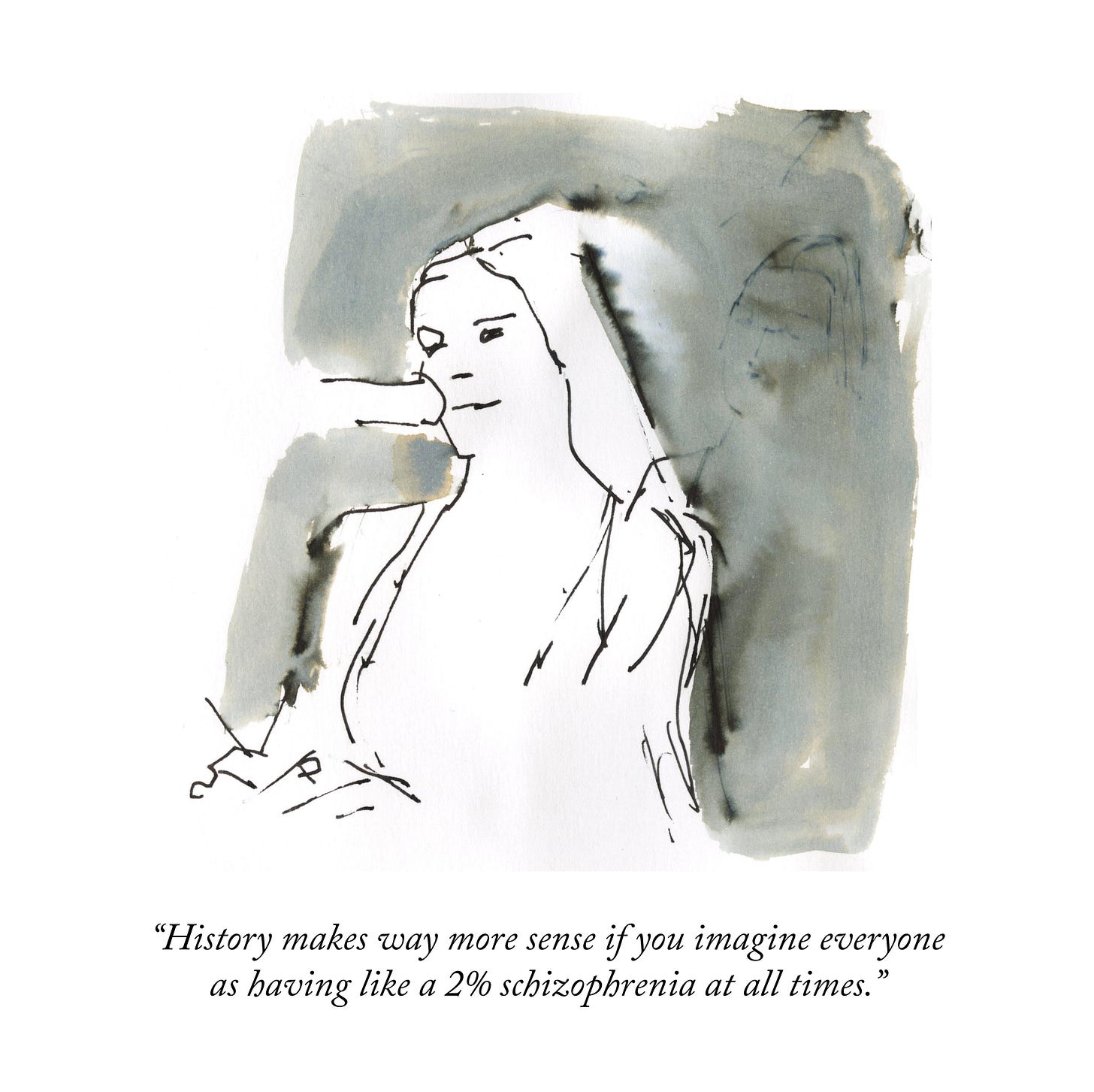
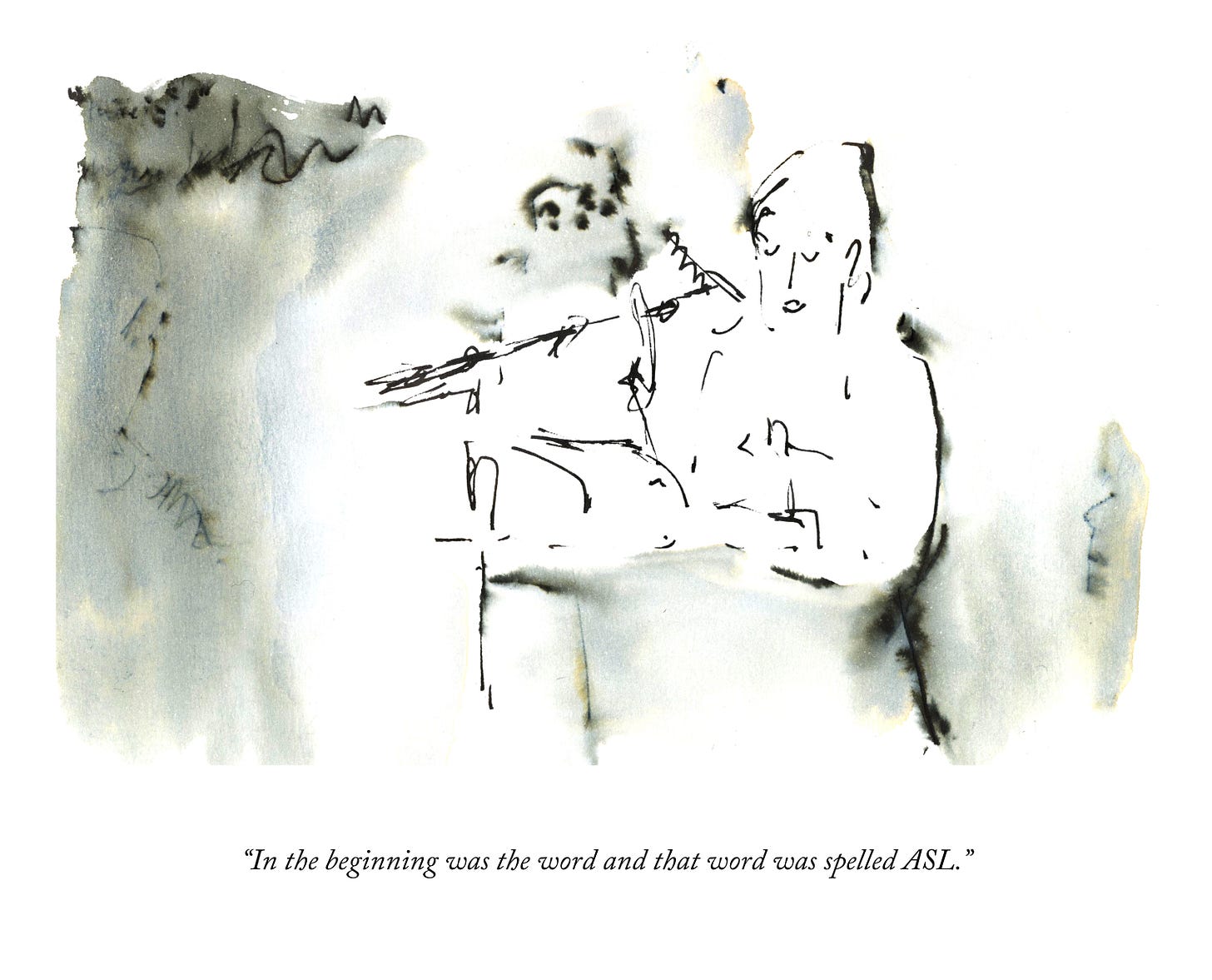
WOW! This is amazing, thank you!!